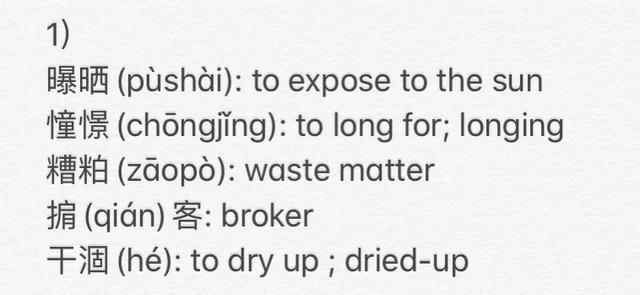150个易念错的汉字(附英语对应语)

粗犷(guǎng): rough; rude; boorish
木屑(xiè): saw dust
绚(xuàn)丽: gorgeous; magnificent
谄(chǎn)媚: to flatter; fawn on sb
棘(jí)手: thorny; troublesome
2)
机械(xiè): machinery; mechanical
砧(zhēn)板: cutting board, chopping block)
谒(yè)见: to pay an audience to
舐(shì)犊情深: deep parental love
拯(zhěng)救: to save;rescue
箴(zhēn)言: admonition; exhortation
翌(yì)日: next day
哺(bǔ)育:to feed
恪(kè)守: to abide by; honour; observe
赏赐(cì): to grant a reward; award
3)
信笺(jiān): letter paper, writing paper
贮(zhù)存: to keep in storage
傍(bàng)晚: toward evening, at dusk, at nightfall
修葺(qì): to repair, renovate
纨绔(wánkù): silk trousers; foppery
阐(chǎn)述: to expound
迁徙(xǐ): to migrate, move; migration
瑰(guī)宝: gem, rarity, rare treasure
澎湃(pài): surging, powerful
采撷(xié): to pick
4)
簇(cù)拥: to cluster round/together; attended by crowd
麻痹(bì): to benumb, slacken
濒(bīn)临: to be close to, border on, be on the verge of
玷(diàn)污: to stain, smear, tarnish, sully
罹(lí)难: to die in a disaster or an accident
嗾(sǒu)使: to instigate, abet
鞭笞(chī): to flog, lash
饿殍(piǎo): bodies of people who starved to death
逮捕(dàibǔ): to arrest
粗糙(cāo): coarse; crudely made
5)
恬(tián)静: tranquil, quiet, peaceful
包庇(bì): to shield, cover up, harbour)
酗(xù)酒: excessive drinking
造诣(yì): academic achievements
揠(yà)苗: to pull up the seedlings
拂(fú)晓: daybreak, fore-dawn,before dawn
嗔怒(chēnnù): to get angry
炽(chì)热: red-hot; blazing; scorching hot
歼(jiān)灭: annihilate, destroy; wipe out
发酵(fājiào): to ferment
6)
畸(jī)形: deformity; malformation
咆(páo)哮: roar; thunder; bark; snarl
手帕(pà): handkerchief
翩跹(piānxiān): lightly; trippingly
蓦(mò)然: suddenly
脍炙(kuàizhì): pork/beaf mince and roast meat
褴褛(lánlǚ): ragged; to be in rags
抚恤(xù): to console or compensate
愤懑(fènmèn): resentful
龋(qǔ)齿: tooth decay; dental caries; decayed tooth
7)
桎梏(zhìgù): fetters and handcuffs
按捺(nà): restrain; control
回溯(sù): look back upon; recall
鞭挞(tà): castigate
塑(sù)料: plastics; plastic material
狡黠(xiá): sly, cunning, crafty
瞠(chēng)目结舌: to stare dumbfounded
媲(pì)美: to compare favourably with; be on a par with; rival; match each other
讣(fù)告: obituary; announce sb’s death
斡(wò)旋: to mediate
8)
联袂(mèi): together
赈(zhèn)济: to relieve, aid
汲(jí)取: to draw
浸透(jìntòu): to soak; saturate; steep)
刚愎(bì): self-willed, headstrong
窠臼kējiù): set pattern
潸(shān)然: in tears, tearful
妊娠(rènshēn): gestation; pregnancy; to be pregnant
阴霾(mái): haze
惴惴(zhuìzhuì)不安: to be anxious and fearful; feel uneasy
9)
栉(zhì)风沐雨: to travel or work despite wind and rain; be combed by the wind and bathed by the rain
病入膏肓(gāohuāng): be incurably sick
百舸(gě)争流(舸:大船barge)
流水淙(cóng)淙: gurgling flowing water
针砭(biān): an ancient form of acupuncture
莅(lì)临: to arrive, be present)
取缔(qǔdì): to outlaw; ban; prohibit; forbid)
证券(quàn): bond, security
喟(kuì)叹: sigh with deep feeling
嫩(nèn)叶: tender leaf
10)
混淆(hùnxiáo): to confound; confuse
谬(miù)论: fallacy; absurd theory
湍(tuān)急: swift, rapid, torrential
冗(rǒng)长: tediously long; prolix
吮吸(shǔnxī): suck, absorb
高耸(sǒng): to stand tall and erect; lofty; towering)
怂(sǒng)恿: to incite; egg sb on; abet)
怙(hù)恶不悛(quān): to persist in evil and not to repent)
酝酿(yùnniàng): to brew; ferment
铿锵(kēngqiāng): to ring, clang, jingle
11)
悚(sǒng)然: terrified, horrified
唾(tuò)弃: cast aside; spurn; disdain and reject
恫吓(hè) to threaten; intimidate; frighten)
要挟(yāoxié): to coerce; put pressure on; threaten)
呜咽(yè): sob; whimper; make mournful sounds
拓(tà)片: rubbing
开拓(tuò): to open up, exploit)
禅(shàn)让: abdicate and hand over the crown to another person
呆(dāi)板: stiff; inflexible; rigid
凹(āo)陷: sunken; hollow
12)
叨(tāo)扰: to thank you for your hospitality
唠叨(láodɑo): to chatter; be garrulous
提(dī)防: to take precautions against; be on guard against; beware of
怨怼(duì): to resent; resentment
咯(kǎ)血: the coughing up of blood; to spit blood
龟裂(jūnliè): to be full of cracks
屏息(bǐngxī): to hold one’s breath
侧(zhāi)歪: to tilt, incline, slant
数(shuò)见不鲜(xiān): common occurrence; It’s often seen and not a rare thing
鲜(xiǎn)为人知: rarely known by people
13)
自怨自艾(yì): to bemoan one's fate; self-reproach
方兴未艾(ài): to be still growing; It is well under way without signs of slackening
否(pǐ)极泰来: after extreme bad luck, comes good luck
审时度(duó)势: to correctly appraise the situation
心宽体胖(pán): to be carefree and grow fat
崴嵬(wēiwéi): lofty, towering
扁(piān)舟: small boat, skiff
大腹便便(piánpián): potbellied; big-bellied; paunchy
鸿鹄(hú): a large swan
气概(qìgài): lofty quality; mettle; spirit
14)
愤慨(fènkǎi): indignation
偌(ruò)大: so big; of such a size
同仇敌忾(kài): have the same enemy and hatred
游弋(yì): cruise
纸鸢(yuān): kite
毒枭(xiāo): drug trafficker
掸(shàn)邦: Shan State
参差(cēncī): irregular; uneven in length/size/height
虚与委蛇(yí): to deal with sb. courteously but without sincerity
胴(dòng)体: carcass
15)
狙(jū)击: to snipe at sb/sth)
一曝(pù )十寒: to work hard for one day and do nothing for ten
赴(fù): go to; attend
白炽(chì): white glow; white heat; giving off light when heated
婆娑(pósuō): whirling; dancing
圩垸(wéiyuàn): protective embankments in lakeside areas; polder
圩(xū)市: country fair; market
崴(wǎi)了脚: to sprain one’s ankle
任(rén)弼时: Ren Bishi
(编译|周柯楠)
,




